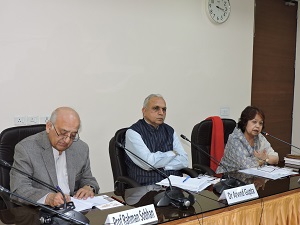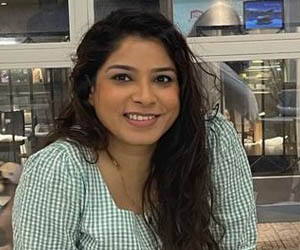The Vivekananda International Foundation recently hosted a talk Bangladesh: Promise and Performance, delivered by Prof. Rounaq Jahan and Prof. Rehman, chaired by Dr Arvind Gupta, Director VIF. Prof. Rounaq Jahan began her talk by giving a detailed account of the promises made by Bangladesh and the expectations within and outside the country. She emphasized on the fact that the emergence of Bangladesh was unique because it was the first case of successful emergence of state based on linguistic nationalist movement in the postcolonial scenario. Secondly, she referred to the independence of Bangladesh as a result of armed struggle. She highlighted that to understand the political developments in Bangladesh, it is important to understand the nine months of the liberation struggle, which left a deep impact on its trajectory.
She then described the promises made by Bangladesh to define the political scenarios in the country. The first promise was the need for a secular state, where religion will be a private affair and each had to celebrate and tolerate diversity. The second was democracy, after its struggle against military rule. And third, that people will be liberated from all kinds of oppression. These were enshrined in the Constitution in 1972 as four guiding principles i.e. Nationalism, Secularism, Socialism and Democracy. The dream was to make 'Sonar Bangla'. But concerns were also raised by the outside world about its survival. Henry Kissinger's termed Bangladesh as a 'Basket case', a country full of natural disasters.
Following this, she laid down the challenges that Bangladesh faced as a country in its journey to emerge as a nation-state. The first fifteen years had been full of challenges for a war-ravaged country, with ten million refugees to serve with basic amenities, and incidents of natural calamities. There was political turmoil as the Father of the Nation was assassinated and there was military rule till 1991. Prof Ronouq elaborately described the political journey of Bangladesh since 1991, and how the promises made at the time of Independence faced challenges. She particularly talked about principles of secularism and democracy and how there were backslides and renewal of the same. She concluded by underlining the social and economic indicators that have made steady progress. She described Bangladesh as a success story because of its better performance in some indicators than other South Asian countries like Pakistan and India. The focus on social development since the mid-'80s have yielded results in terms of better life expectancy, improved Total Fertility rate, zero cases of open defecation and access to safe drinking water.
Prof Rehman Sobhan also spoke about the brief political history of how Bangladesh was formed and how he was part of the political debate since the 1950s. He gave an inside and deeper view of how the Government started to form and various government policies and programmes were shaped. He explained the economic story of Bangladesh, which had to go through the periods of instabilities since the mid-80s. The process of economic development in Bangladesh started and accelerated in the '90s. He gave the example of the ready-made garments where Bangladesh has now become the second-largest exporter in the world.
The export growth stimulated economy helped to resolve the balance of payment issues. Also, the large-scale overseas migration contributed immensely to the remittances largely from the Middle East initially, it later expanded to both west and east. Therefore, from being heavily dependent on aid from around 10 to 12 per cent in initial years, it has been reduced to two per cent in present times. The growth rate from about the turn of the twenty-first century, under successive governments picked up from 4 per cent to the present rate of around 7 per cent plus. This has led to the hopes for the country to graduate from the Least Developed Country status to middle-income country status.
He gave a detailed account of each sector of the economy from agriculture to the industrial sector. In the agricultural sector, he described how there has been an increase in food grains production and how they have increased investments in the livestock sector. The dynamic rural economy gave rise to the emergence of small-medium industries and the industrial sector too diversified itself in various sectors such as the pharmaceutical industry, cement and construction industry, steel industries and so on.
Prof Rehman Shoban explained how the economy managed to survive despite the political instabilities and to explain this, he went to the historical genesis of the country since the years of Mughal conquest and British domination which had led to the process of dependence. And since 1947, how these layers of domination slowly started to go away, with the end of the British rule and later the end of Pakistan's domination. The lack of indigenous development unleashed the level of entrepreneurship soon these layers of domination got erased. For instance, there was a sudden rise of small entrepreneurs who got involved in trade and then slowly formed large-scale industries. Women also started using microcredit and then started expanding and working with government industries. He also attributed the success of Bangladesh to the wide network of NGOs which acted as dynamic institutions of intermediation to deliver various services such as health services, small businesses and so on. He gave the example of BRAC (Building Resources Across Communities) which is currently one of the world's largest NGO.
In the end, he raised the problems, which need to be addressed by the country to successfully adopt a steady path of progress. The problem of corruption and governance are major loopholes that need immediate attention according to Prof. Rehman Shoban. He gave the example of the crises in the banking system that accumulated due to poor regulation, cronyism and nepotism.
The presentations were followed by the discussion that highlighted the other dimensions in the political and economic developments of the country. Amongst several issues raised, the concern about India's role and importance in the development of the country and also expressed doubts about the political situation in Bangladesh, which is again a sensitive issue.
The discussion also opened new dimensions to the interaction to understand the relations in South Asia with the increasing participation of the Chinese and what role Chinese investments play in Bangladesh. Concerns were also raised about the two-party politics and whether there is the scope of any new party adding to political mix. And finally, how student politics in Bangladesh has impacted the political dynamism in the country.
Both the speakers elaborated on each of these points to give us a comprehensive picture of the political and economic developments in Bangladesh.
The talk was attended by both experts from outside as well as many from within the VIF.





Post new comment